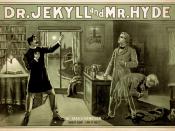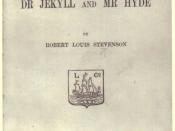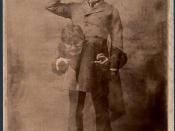The subject of Victorian time conversion that emerges from my exploration moves in the opposite direction--toward the splitting, or disaggregation, of the self that make Jekyll and Hyde an instructive narrative in the consideration of Victorian time subjectivity. Stevenson's interest in the multiplicity of the self predates the publication of Jekyll and Hyde by at least five years. It is actually a portrayal of Stevenson s own life. Stevenson suffered from a series of nightmares in which he lived a double life. In the day he worked as a respectable doctor, but in the night he was forced to fall victim to a monster who roamed the alleys of his own town. Stevenson decided to write about his experiences rather than hide from them. So within a matter of three days, Stevenson wrote a manuscript that detailed his mysterious life (Halevy, 2001).
Stevenson pondered the changes that come about with age, observing that they can occasionally be drastic and amount to reversals.
He himself, the essay tells us, was once a socialist but tended toward conservatism as he grew older. Leaving aside questions of historical accuracy in Stevenson's assertion, it is possible to note that he saw the crisis of the Damascene moment as being characterized by both change and continuity: despite the extreme nature of the event, something of Paul's character as a Victorian time was traceable to something in his pre-conversion identity (zeal). Such continuity-in-discontinuity would later find its way into the strange, unsettling description of self-division in Jekyll and Hyde. Stevenson's story, however, owes a lot more to the writings of Paul than an interest in the idea that something survives the most radical change within the self.
Because Jekyll can not recall any actions that he commits while in the form of Mr. Hyde, he does...


